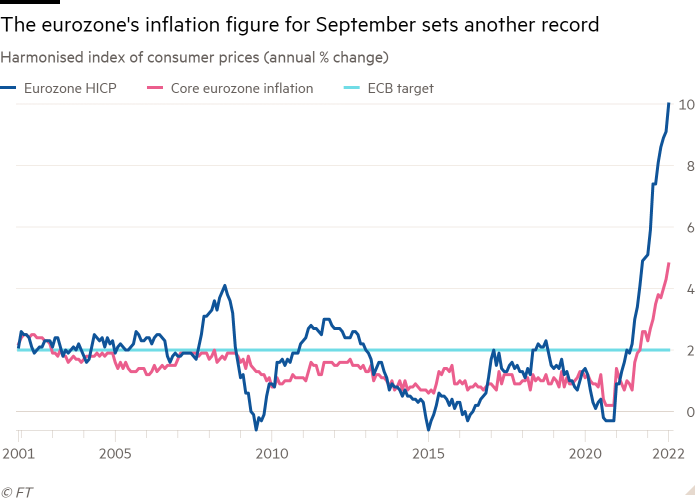[ad_1]
Inflation in the euro area hit a new high for the 11th consecutive month as energy prices continued to rise, bolstering calls for the European Central Bank to continue aggressive interest rate rises when it meets next month.
Consumer prices in the eurozone rose 10 per cent in the year to September, accelerating from 9.1 per cent in August, which was already the highest level in the euro’s 23-year history. The price rises also outstripped the 9.7 per cent expected by economists polled by Reuters.
Russia’s squeezing of gas supplies to Europe after its invasion of Ukraine has sent energy prices surging and forced governments to intervene by spending hundreds of billions of euros to shield consumers and businesses from the fallout. Energy prices rose 40.8 per cent in September, up from 38.6 per cent the previous month, according to a flash estimate by Eurostat, the European Commission’s statistics arm.
EU energy ministers were on Friday due to discuss windfall levies on non-gas power generators and fossil fuel companies and a cut to peak electricity consumption of 5 per cent, as well as a potential cap on wholesale gas prices. Economists expect the 19-country bloc to fall in recession this winter, as households reduce their spending and industrial groups cut back on production.
Carsten Brzeski, an economist at Dutch bank ING, said new fiscal support measures would “soften the recession in the eurozone and lower the peak of inflation, but also mean the fall in inflation next year will be less accentuated because you will have stronger demand”.

Prices of food, alcohol and tobacco in the eurozone rose 11.8 per cent, up from 10.6 per cent in August. Core inflation, which excludes more volatile energy and food prices to offer economists a clearer idea of underlying price pressures, rose 4.8 per cent, up from 4.3 per cent in August.
More than half the euro area’s 19 countries had double-digit levels of inflation and in three Baltic countries it was above 20 per cent. However, inflation slowed in France from 6.6 per cent to 6.2 per cent — the lowest in the bloc thanks to large subsidies on energy bills. Dutch finance minister Sigrid Kaag said it was “terrible” that inflation in the country had hit 17.1 per cent.
The overall eurozone figure was lifted by German inflation, which hit a new 71-year-high of 10.9 per cent in September after the expiry of government measures to cushion the impact of the energy crisis, including a fuel duty rebate and a subsidised €9 monthly train ticket.
However, Germany on Thursday became the latest EU country to announce further measures to reduce energy costs for consumers and businesses. Berlin aims to spend €200bn on capping gas and electricity prices.
Deutsche Bank economists estimated Berlin’s plan would knock 3 percentage points off German inflation next year compared with the bank’s previous forecast of 9 per cent and soften the fall in 2023 output to minus 2 per cent, compared with its previous forecast of minus 3.5 per cent.
The ECB, which targets inflation of 2 per cent, has said inflation is “far too high” and indicated it intends to keep raising rates until price growth slows down appreciably. The central bank has raised its deposit rate by 1.25 percentage points at its last two policy meetings and markets are pricing in a further 0.75 percentage point rise on October 27.
Nouriel Roubini, economics professor at New York University, predicted in a tweet that the eurozone was heading for a “stagflationary hard landing” caused by persistently high inflation and stagnant growth. He warned the ECB would have to raise rates “faster and sooner causing serious economic, financial and political stresses”.
Separate figures from Eurostat on Friday showed the total number of unemployed people in the euro area fell by 30,000 to just below 11mn in August, the smallest monthly decline so far this year, while the jobless rate remained flat at 6.6 per cent.
Jessica Hinds, an economist at Capital Economics, said: “We expect the tight labour market to keep upward pressure on pay settlements,” which she predicted would keep services prices rising and push overall eurozone inflation even higher in the coming months.
[ad_2]
Source link

